Institute for Research on Innovation and Services for Development
Resilience - Innovation - Sustainable Development | Transparency – Organization – Meritocracy
AVVISO PUBBLICO N° MI 1/2020 DI MANIFESTAZIONE DI INTERESSE
AVVISO PUBBLICO N° MI 1/2020 DI MANIFESTAZIONE DI INTERESSE PER LA PARTECIPAZIONE AD UN PARTENARIATO CON CNR-IRISS FINALIZZATO ALLA PRESENTAZIONE DI UN’ISTANZA DI FINANZIAMENTO NELL’AMBITO PO FEAMP 2014/2020 – BANDO DI ATTUAZIONE MULTIMISURA DI CUI AL DECRETO DIRIGENZIALE N° 167 DEL 06/08/2020 DIREZIONE GENERALE 7 UOD 5 DELLA REGIONE CAMPANIA.
Scadenza: 01/09/2020
August 18th, 2020
Two Calls for Papers on Migration Issues (deadlines 30 September and 15 October 2020)

 CNR-IRISS is working jointly with the University of Naples “Federico II” on migration issues. In the framework of this cooperation a Jean Monnet module for a Summer School on Labour Migration in the European Union (EULab) has been set up. Due to current circumstances regarding the COVID-19 pandemic outbreak, the first edition of the Summer School has been rescheduled to July 2021. But, The EULab Summer School invites submissions for the volume “Labour Migration in the Time of COVID-19: Inequalities and Perspectives for Change” (Fulvia Staiano and Giulia Cilberto eds.). The edited book intends to analyse the diverse difficulties posed to migrant workers by the current COVID-19 pandemic, and to explore the complex role played by international and EU law in this context. Submissions from scholars with an interest in migration studies from a variety of backgrounds, including but not limited to law, international relations and social sciences are welcomed. Submissions that adopt an interdisciplinary perspective are particularly encouraged. Abstracts should be submitted to eulab2020@gmail.com by 30 September 2020.
CNR-IRISS is working jointly with the University of Naples “Federico II” on migration issues. In the framework of this cooperation a Jean Monnet module for a Summer School on Labour Migration in the European Union (EULab) has been set up. Due to current circumstances regarding the COVID-19 pandemic outbreak, the first edition of the Summer School has been rescheduled to July 2021. But, The EULab Summer School invites submissions for the volume “Labour Migration in the Time of COVID-19: Inequalities and Perspectives for Change” (Fulvia Staiano and Giulia Cilberto eds.). The edited book intends to analyse the diverse difficulties posed to migrant workers by the current COVID-19 pandemic, and to explore the complex role played by international and EU law in this context. Submissions from scholars with an interest in migration studies from a variety of backgrounds, including but not limited to law, international relations and social sciences are welcomed. Submissions that adopt an interdisciplinary perspective are particularly encouraged. Abstracts should be submitted to eulab2020@gmail.com by 30 September 2020.
The issue of global cooperation in the promotion of cultural rights of migrants, including the right to participate in cultural life and to enjoy the arts, in the context of the post- COVID-19 pandemic outbreak is the goal the call for papers for the volume “Migration and Culture: Implementation of Cultural Rights of Migrants” (Giovanni Carlo Bruno, Fulvio Maria Palombino, Adriana Di Stefano, Gianpaolo Maria Ruotolo Eds.). The call for papers aims to offer an opportunity for experts, scholars and policy makers, for a critical review of the national and international practice on cultural rights of migrants. Abstracts should be submitted to migrationandevelopment@gmail.com by 15 October 2020.
For further information, dr. Giovanni Carlo Bruno, gc.bruno@iriss.cnr.it
Resources
- Call for papers – Migration and Culture: Implementation of Cultural Rights of Migrants
- Call for papers – Labour Migration in the time of COVID-19: Inequalities and Perspectives for Change
August 6th, 2020
AVVISO DI SELEZIONE IRISS AR 3/2020
PUBBLICA SELEZIONE PER IL CONFERIMENTO DI N° 1 ASSEGNO “PROFESSIONALIZZANTE” PER LO SVOLGIMENTO DI ATTIVITÀ DI RICERCA NELL’AMBITO DEL PROGETTO “CONTROLLO SULLE ATTIVITÀ DI PESCA A SEGUITO DELL’EVOLUZIONE NORMATIVA A MEZZO DI UN APPROCCIO INTEGRATO E CON L’UTILIZZO DI SISTEMI INNOVATIVI” – FINANZIATO DAL MINISTERO DELLE POLITICHE AGRICOLE ALIMENTARI FORESTALI (MIPAAF) NELL’AMBITO DELL’ACCORDO DI COLLABORAZIONE (EX ART. 15 DELLA LEGGE 241/90) TRA MIPAAF – DIPARTIMENTO DELLE POLITICHE COMPETITIVE, DELLA QUALITÀ AGROALIMENTARE, IPPICHE E DELLA PESCA – DIREZIONE GENERALE DELLA PESCA MARITTIMA E DELL’ACQUACOLTURA E CONSIGLIO NAZIONALE DELLE RICERCHE – ISTITUTO DI RICERCA SU INNOVAZIONI E SERVIZI PER LO SVILUPPO (CNR-IRISS) – PROT. N. 671 DEL 23/07/2019.
Scadenza: 25/08/2020
August 3rd, 2020
Convegno “La cultura come cura. Per un turismo sostenibile e una rinnovata comunità di patrimonio” – Napoli, 29 luglio 2020
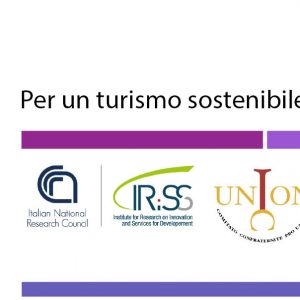

Il convegno “La cultura come cura. Per un turismo sostenibile e una rinnovata comunità di patrimonio” si terrà mercoledì, 29 Luglio 2020, nella splendida Sagrestia Vecchia (“Sala Vasari”) del Complesso Monumentale di Sant’Anna dei Lombardi, a Napoli.
Sono previsti gli interventi di
- Padre Salvatore Fratellanza, Presidente del Comitato di Gestione delle Arciconfraternite Commissariate;
- Alfonso Morvillo, CNR IRISS, Presidente del Comitato Confraternite Pro UNESCO (UNI-CON);
- Marcella De Martino, Prima Ricercatrice Istituto di Ricerca su Innovazione e Servizi per lo Sviluppo CNR IRISS;
- Maria Teresa Moccia di Fraia, Archeologa, Associazione la Rotta di Enea;
- Roberta Varriale, Ricercatrice Istituto di Studi sul Mediterraneo ISMED – CNR;
- Alessio Pascucci, Sindaco di Cerveteri, Presidente della Associazione Beni Italiani Patrimonio Mondiale.
Conclude i lavori Elena Coccia, Consigliera Metropolitana delegata alla cura del Patrimonio Culturale e rete dei Siti UNESCO.
È invitato, per un proprio indirizzo di saluto, il Sindaco Metropolitano, Luigi de Magistris.
Il convegno è promosso dalla Città Metropolitana di Napoli, in collaborazione con il Comitato Confraternite pro UNESCO (UNI-CON) – Comitato per il riconoscimento delle Confraternite come Patrimonio Culturale Immateriale dell’Umanità presso l’UNESCO; l’Istituto di Ricerca su Innovazione e Servizi per lo Sviluppo (IRISS) – Consiglio Nazionale delle Ricerche (CNR); e l’Associazione Beni Italiani Patrimonio Mondiale.
La partecipazione al Convegno sarà regolata da un sistema di prenotazione on line in ottemperanza ai dispositivi di sicurezza vigenti. L’accesso può essere effettuato previa prenotazione, tramite compilazione dell’apposito modulo.
I visitatori e le visitatrici sono tenuti ad attenersi al protocollo inerente al contenimento della diffusione del coronavirus COVID 19 e seguire le indicazioni del personale addetto.
July 27th, 2020
The Horizon 2020 BeCULTOUR project selected for funding by the European Commission
CNR IRISS is Coordinator of the Horizon 2020 BeCULTOUR project, selected for funding by the European Commission under the H2020 Call “Innovative approaches to urban and regional development through cultural tourism” (H2020 TRANSFORMATIONS-04-2019-2020).
The project has received an outstanding evaluation: it was scored 15 (maximum score) and resulted as the first project on almost 90 proposals submitted under the H2020 Call.
BeCULTOUR stands for “Beyond CULtural TOURism: heritage innovation networks as drivers of Europeanisation towards a human-centred and circular tourism economy”.
It expresses the goal to move beyond tourism through a longer-term human-centred development perspective, enhancing cultural heritage and landscape values.
The Consortium is made of 15 partners from EU and non-EU countries, including ICLEI, ERRIN, ICHEC, Iniziativa Cube, Open University of the Netherlands, Uppsala University, and six pilots in Italy (Basilicata), Cyprus, Spain (Aragon), Västra Götaland region, Serbia (Vojvodina), and a joint pilot at the cross-border of North-East Romania and Moldova.
The project is worth 4 Million Euro and will last 3 years (2021-2023) during which the experienced Consortium partners will co-create and test sustainable human-centred innovations for circular cultural tourism through collaborative innovation networks/methodologies and improved investments strategies, targeting deprived remote, peripheral or deindustrialized areas and cultural landscapes as well as over-exploited areas.
The CNR IRISS team coordinating the project is strongly inter-disciplinary: Antonia Gravagnuolo, architect and expert in evaluation methods for cultural heritage and landscape conservation and circular economy, co-coordinator of the Horizon 2020 project “CLIC” led by CNR IRISS, and Alessandra Marasco, service management researcher and expert in collaborative innovation and service experience design in cultural tourism. scientific responsible for many research projects at CNR IRISS.
The team was supported by Silvia Iodice, a promising researcher particularly expert in urban metabolisms assessment.
More news to come soon!
July 22nd, 2020
AVVISO DI SELEZIONE IRISS AR 2/2020
PUBBLICA SELEZIONE PER IL CONFERIMENTO DI N° 1 ASSEGNO “PROFESSIONALIZZANTE” PER LO SVOLGIMENTO DI ATTIVITÀ DI RICERCA NELL’AMBITO DEL PROGRAMMA DI RICERCA “IDEHA – Innovazioni per l’elaborazione dei dati nel settore del Patrimonio Culturale” – (CUP B26C18000240005)
Scadenza: 05/08/2020
July 20th, 2020
CLIC Startup Competition – Napoli 25/27 novembre 2020


Si svolgerà a Napoli dal 25 al 27 novembre 2020 l’evento finale della “CLIC Startup Competition” finalizzata a promuovere su scala internazionale le idee innovative di early-stage startup, team informali e innovatori.
L’azione e l’evento finale sono coordinati dall’Istituto di Ricerca per l’Innovazione e i Servizi per lo Sviluppo del Consiglio Nazionale delle Ricerche nell’ambito del progetto CLIC “Circular models Leveraging Investments in Cultural heritage adaptive reuse“, finanziato dal programma di ricerca e innovazione Horizon 2020 dell’Unione Europea.
La startup competition è supportata da SEMED “Startup Europe Mediterranean”, piattaforma digitale per startup e investitori, supportata da FacilityLive, in collaborazione con l’iniziativa “Startup Europe” promossa dalla Commissione Europea.
La Startup Competition nasce con l’intento di premiare e sostenere le migliori business ideas e startup nel settore del riuso del patrimonio culturale ispirate ai principi della sostenibilità e della finanza sociale ed etica nell’ottica dell’economia circolare.
In particolare, la Startup Competition si propone di:
– accrescere la capacità imprenditoriale e l’innovazione nel settore del patrimonio culturale;
– fornire nuove opportunità per le imprese e gli innovatori;
– stimolare l’ecosistema delle startup nel settore dei beni culturali
Il Concorso Startup è aperto agli aspiranti startupper e agli imprenditori già attivi, incoraggiando l’interazione tra loro e gli esperti, promuovendo le idee imprenditoriali presso gli investitori pubblici e privati, sostenendo la creazione e l’accelerazione delle imprese.
L’evento finale della Startup Competition si svolgerà in tre giornate in cui verranno coinvolti esperti, ricercatori, imprenditori, policy maker e intermediari finanziari.
La prima giornata sarà dedicata ad un Living Lab diviso in 2 momenti, Inspiring Key Note Speeches, per condividere buone pratiche europee, e i Living Tables, per consentire agli stakeholder provenienti da diversi paesi di confrontarsi.
La seconda e la terza giornata, dedicate alle iniziative innovative e creative della startup competition, prevede 2 azioni, la prima rivolta alla realizzazione dei PITCH con l’aiuto di mentor ed esperti, la seconda alla presentazione delle idee di impresa a una giuria qualificata, che premierà le 5 migliori selezionate.
I progetti vincitori accederanno a un programma di mentoring del valore complessivo di 15.000 € fornito da Iniziativa Cube, partner CLIC, e saranno supportati nella messa a punto del business model, nell’elaborazione del loro business plan e nello scouting degli investitori per la raccolta di fondi.
I servizi di mentoring e accelerazione si svolgeranno da dicembre 2020 a marzo 2021 e potranno essere seguiti sia fisicamente che a distanza.
I 5 vincitori saranno premiati da SEMED con un profilo premium gratuito per 12 mesi, in caso di startup, e la visibilità nella vetrina CLIC per 12 mesi per innovatori e team informali.
Il bando di gara è rivolto a team informali, start up in fase early stage o pre seed e innovatori che operano nei seguenti – ma non solo – ambiti di intervento:
- Cultural, safe and sustainable tourism
- Creative, cultural, education and enterntainement industries
- Heritage community, social innovation and ethical finance
- Technologies and materials for the circular city and building
- Abandoned cultural landscapes regeneration
Risorse
- Per essere sempre aggiornati sulle attività del progetto e ricevere notizie, opportunità e suggerimenti relativi al mondo delle startup e degli innovatori, vi invitiamo ad iscrivervi alla Newsletter CLIC
- Sito web: startup-competition
- Per ulteriori informazioni scrivere al seguente indirizzo e-mail: communicationclic@iriss.cnr.it
July 17th, 2020
Progetto “TU/TTO – Testi Teatro Opere” – Progetto di rigenerazione urbana “creativa” a San Giovanni a Teduccio – Napoli

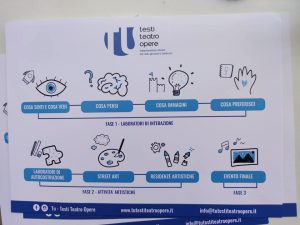 “TU/TTO – Testi Teatro Opere” è un progetto di rigenerazione urbana che intende catalizzare l’energia creativa che si sviluppa nel tessuto sociale per trasformarla in azioni consapevoli e responsabili mediante l’arte.
“TU/TTO – Testi Teatro Opere” è un progetto di rigenerazione urbana che intende catalizzare l’energia creativa che si sviluppa nel tessuto sociale per trasformarla in azioni consapevoli e responsabili mediante l’arte.
Il progetto, vincitore del bando “Creative Living Lab – II Edizione”, è promosso e sostenuto dalla Direzione Generale Creatività Contemporanea (DGCC) del Ministero per i Beni e le Attività Culturali e per il Turismo (MiBACT).
Lo spazio dell’intervento di TU/TTO è la piazzetta antistante il Centro ART33 cultural hub e l’IC Sarria-Monti, sito nel quartiere di San Giovanni a Teduccio (Napoli) in via Bernardino Martirano.
Tale spazio si configura come area pedonale e area di accesso all’Istituto Comprensivo Sarria Monti, al centro ART33 cultural hub, nei pressi sono ubicati anche il teatro NEST (Napoli ESt Teatro) e l’incubatore Napoli Est.
TU/TTO intende mettere in relazione l’individuo con il tutto; non solo il singolo con l’altro, per fare comunità, ma anche la comunità con lo spazio urbano che abita quotidianamente.
Sono state attivate le seguenti azioni progettuali: 1) interazione tra gli “attori” in campo; 2) co-progettazione e realizzazione dei moduli di arredo e interventi di street art; 3) residenze artistiche; 4) evento conclusivo.
Il progetto, presentato dall’associazione “Gioco Immagine e Parole” e dall’associazione “COLLA/Collaborative in learning and action”, è svolto in collaborazione con IC Statale 47° Sarria- Monti Napoli, Art33 – Cultural Hub, il CNR IRISS e il Dipartimento di Studi Umanistici dell’Università degli Studi di Napoli Federico II, con il patrocinio del Comune di Napoli.
Il progetto, all’interno delle attività di ricerca sui processi decisionali collaborativi per la rigenerazione urbana svolte nel CNR IRISS, è sotto la responsabilità scientifica di Eleonora Giovene di Girasole con il supporto di Gaia Daldanise.
Risorse
July 16th, 2020
Marco Fasciglione è stato nominato componente del Management Board dell’Agenzia europea dei diritti fondamentali (FRA)
Marco Fasciglione, ricercatore di Diritto internazionale del CNR IRISS e Responsabile scientifico del progetto CO.RE. Corporate Human Rights and Environmental Due Diligence e la Promozione della Corporate Responsibility, è stato nominato Alternate Member nel Management Board dell’Agenzia europea dei diritti fondamentali (Fundamental Rights Agency – FRA).
L’Agenzia è stata istituita nel 2007 dal Regolamento (CE) n. 168/2007 del Consiglio allo scopo di fornire assistenza e consulenza in materia di diritti fondamentali alle istituzioni, organi, uffici e agenzie dell’Unione Europea e agli Stati membri.
Tra i suoi principali compiti la FRA realizza studi e ricerche in materia di diritti fondamentali; svolge attività di promozione e di sensibilizzazione in materia di diritti umani per il grande pubblico; formula conclusioni e pareri su specifiche problematiche attinenti i diritti umani; pubblica relazioni annuali sullo stato di attuazione dei diritti umani in Europa, segnalando gli esempi di buone pratiche.
Il Management Board (Consiglio di amministrazione dell’Agenzia) è composto da esperti indipendenti in materia di diritti umani, con esperienza nella gestione di organizzazioni del settore pubblico o privato.
Il Management Board sovraintende al funzionamento dell’Agenzia, definendo, tra l’altro, le priorità operative della FRA; inoltre, approva il bilancio e nomina il Direttore dell’Agenzia e i componenti del Comitato scientifico dell’Agenzia.
Nel prestigioso incarico, Marco Fasciglione affiancherà Oreste Pollicino, Professore ordinario di diritto costituzionale nell’Università Bocconi, per un mandato della durata di cinque anni.
Risorse
- Per ulteriori informazioni è possibile contattare il Responsabile del progetto CO.RE. Corporate Human Rights and Environmental Due Diligence e la Promozione della Corporate Responsibility: dott. Marco Fasciglione – m.fasciglione@iriss.cnr.it; +39 081 2470991
July 13th, 2020
Comunità di Pratiche Creative per la Campania – quarto incontro del progetto “Rete per il Sud” – 9 Luglio 2020
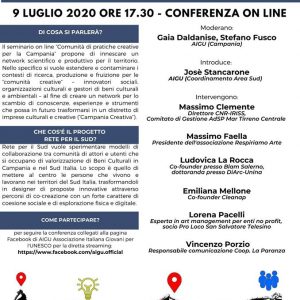
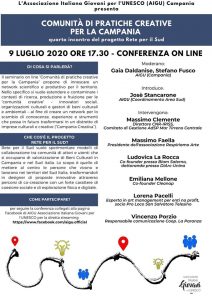 Il 9 luglio 2020 alle ore 17.30 si terrà il seminario on line “Comunità di pratiche creative per la Campania”, quarto incontro del progetto “Rete per il Sud” di AIGU Campania, che propone di innescare un network scientifico e produttivo per il territorio.
Il 9 luglio 2020 alle ore 17.30 si terrà il seminario on line “Comunità di pratiche creative per la Campania”, quarto incontro del progetto “Rete per il Sud” di AIGU Campania, che propone di innescare un network scientifico e produttivo per il territorio.
Nello specifico si vogliono estendere e contaminare i contesti di ricerca, produzione e fruizione per le “comunità creative” – innovatori sociali, organizzazioni culturali e gestori di beni culturali e ambientali – al fine di costruire un network per lo scambio di conoscenze, esperienze e strumenti che possa in futuro trasformarsi in un distretto di imprese culturali e creative (“Campania Creativa”).
Durante l’evento, che sarà moderato da Gaia Daldanise (CNR IRISS e coordinatrice regionale di AIGU Campania) e da Stefano Fusco (coordinatore regionale di AIGU Campania), interverranno Josè Stancarone (AIGU Coordinamento Area Sud), Massimo Clemente (Direttore del CNR IRISS e membro del Comitato di Gestione AdSP Mar Tirreno Centrale), Massimo Faella (Presidente dell’associazione Respiriamo Arte), Ludovica La Rocca (Co-founder presso Blam Salerno e dottoranda presso DiARC-Unina), Emiliana Mellone (Co-founder Cleanap), Lorena Pacelli (Esperta in art management per enti no profit e socio Pro Loco San Salvatore Telesino), Vincenzo Porzio (Responsabile comunicazione della Cooperativa La Paranza).
L’evento si inserisce nelle attività di terza missione delle ricerche sui processi decisionali collaborativi per la valorizzazione del patrimonio culturale svolti dagli architetti del Consiglio Nazionale delle Ricerche – Istituto di Ricerca su Innovazione e Servizi per lo Sviluppo.
Risorse
- Per seguire la conferenza è necessario collegarsi alla pagina Facebook di AIGU Associazione Italiana Giovani per l’UNESCO per la diretta streaming: https://www.facebook.com/aigu.official
- Locandina
July 7th, 2020
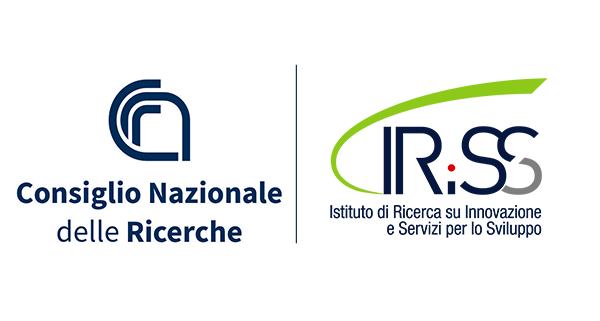
You must be logged in to post a comment.